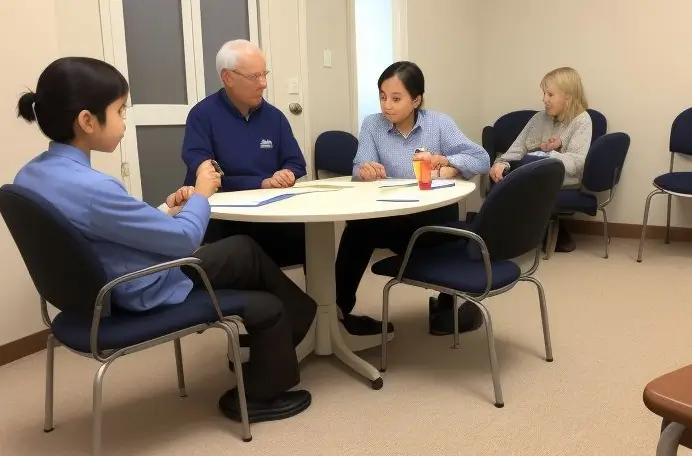Introduction Top 10 Common Job Interview Questions and How to Answer Them
In today’s competitive job market, preparing for your next job interview is essential for success. Interviews serve as a critical platform for both employers and job seekers, enabling the hiring manager to gauge whether a candidate is the right fit for the work environment, while allowing candidates to demonstrate their skills and suitability for the role. Understanding the top 10 most common job interview questions can significantly enhance your chances of making a positive impression.
One of the most common pitfalls candidates face is not adequately preparing for common interview questions and answers. Taking the time to think about how to answer this question can make a considerable difference during your next interview. By familiarizing yourself with the 10 common interview questions that hiring managers often ask in an interview, you can develop the best answer that reflects your abilities and aligns with the job description. Moreover, you’ll likely find that a well-prepared response can illustrate your strong work ethic and collaborative spirit, which are highly valued in today’s professional landscape.

In this guide to common interview questions, we will offer practical advice on how to prepare for your next interview. We promise to equip you with tips that will help you answer each question confidently and authentically. By showcasing your strengths and suitability for the role, you’ll be better positioned to impress prospective employers and secure your next job.
Importance of Interview Preparation
Preparation for a job interview is crucial, as it significantly impacts your performance and the impression you leave on potential employers. Understanding common questions that may arise can provide you with insights into what an employer is looking for. For instance, being familiar with the top 10 job interview questions can give you an edge when you’re applying for a role such as a project manager. It’s essential to have job interview questions and answers ready, especially regarding your current job and what you’ve done that makes you the right fit for the job.
Additionally, taking the time to research on the company demonstrates that you’re looking to contribute meaningfully. When preparing for your upcoming interview, consider the advice on how to answer top interview questions. You may want to highlight your work style and commitment to being a team player. Proper preparation not only allows you to articulate your experience better but also helps you avoid the wrong answer, which can lead to missed opportunities. In summary, preparation can build confidence and significantly reduce interview anxiety, making you feel more at ease during this important process.
Top 10 Most Common Interview Questions
When preparing for your next interview, it’s essential to familiarize yourself with the top 10 most common interview questions. These questions usually focus on your last job and your experiences, as interviewers want to see how your previous roles relate to the position you’re applying for. One question you’ll likely be asked is, “Can you describe your current role?” This allows employers to gauge your responsibilities and achievements, offering insights into whether you’re the right fit for the position. To craft a compelling response, make sure your answer highlights how your experiences align with the employer’s goals. For example, you might say, “In my current role, I’m working on a team that focuses on increasing customer engagement, which I believe aligns closely with your company’s mission.”

Another commonly asked interview question is, “Why do you want to work here?” This query allows employers to assess your knowledge of the company before the interview and see if you share a common goal with them. To prepare, make sure you’re familiar with the company’s values and recent projects. An effective answer might be, “I’ve followed your company’s innovations in sustainability, and I truly admire your commitment to making a positive impact, which is also my dream job.” By practicing these commonly asked interview questions along with relevant advice, you’ll enhance your confidence and better demonstrate why employers want to hire you.
Question 1: “Tell me about yourself.”
When preparing for an upcoming interview, it’s essential to remember that interviewers ask this question to help them understand who you are as a candidate for the job. Employers ask this to gauge your professional background and see if you’re a good fit for the job. To make your answer effective, keep it brief and focus on your relevant experiences. For instance, you might say, “I am a marketing professional with over five years of experience in digital marketing.” This approach shows that you’re serious about your career and have done your research about the role you’re applying for.
As you prepare, consider the top 10 interview questions and how they relate to your dream job. A thoughtful response can showcase key skills that align with the job requirements. Along with advice from career coaches, think about how part of the job you’re most excited about and how that ties into your previous experiences. Remember, the way to handle this question is to remain focused and redirecting the conversation back to the job at hand can demonstrate your interest in working with the company. Ultimately, job satisfaction is about finding a role where your skills and passions align, so ensure your answer reflects that genuine enthusiasm.
Question 2: “Why do you want to work here?”
When preparing for an interview, one of the 10 of the most common questions an employer may ask is, “Why do you want to work here?” This great question allows you to articulate your motivations and demonstrates your interest in the company. To effectively answer, it’s essential to keep your answer focused and relevant. Researching the company through its website and social media channels can help you identify specific reasons that resonate with your personal values and career goals. For instance, as a software developer, you might express admiration for the company’s innovative technologies or its commitment to customer success.
When I was asked by my boss about my long-term goals, I highlighted my desire to be part of an organization that emphasizes teamwork and ethical practices. Remember one project where I collaborated with key players to implement a software solution that improved efficiency? That experience solidified my understanding of how management skills can significantly impact a company’s success. In an interview coming up, I plan to pick one or two aspects of your company that align with my professional aspirations and values, demonstrating not only my passion for the role but also my commitment to contributing positively to your team.
Question 3: “What are your strengths and weaknesses?”
When you encounter the question, “What are your strengths and weaknesses?” during a basic interview, it’s essential to approach it with self-awareness and honesty. Many interviewers may ask this question to gauge your understanding of yourself and your fit for the role. It’s a moment to shine a light on your personal attributes, and I find it helpful to frame my response positively. For instance, I would highlight how one of my strengths is adaptability; I’ve learned to thrive in various environments, which is a key quality for the job I am applying for.
On the other hand, when discussing weaknesses, it is prudent to frame them as areas of growth. You don’t want to deflect the question, but rather show that you are actively working on improving yourself. I once asked my boss for feedback, and he pointed out that I sometimes struggle with delegation. Recognizing this, I’ve taken steps to trust my team more and enhance my collaborative skills. Ultimately, presenting your strengths and weaknesses thoughtfully can demonstrate to potential employers that you are reflective and committed to personal development.
Question 4: “Describe a challenging situation and how you handled it.”
During the interview process, candidates are often asked to reflect on their past experiences, particularly challenging situations, to truly assess problem-solving skills. I believe this is vital, as it showcases one’s ability to navigate difficulties and emerge stronger. For instance, at my previous job, we faced a sudden issue when our main software system went down unexpectedly. This created significant disruptions, and the team was understandably stressed. I knew I had to take action quickly. Utilizing the STAR method, the situation was clear; I needed to coordinate a response. The task involved organizing the team to troubleshoot the issue efficiently. My action was to delegate roles based on each member’s strengths and communicate with our IT department for support. We managed to resolve the system failure in less than a few hours. As a result, we minimized downtime and maintained our project deadlines. This experience taught me that when challenges arise, remaining calm and focused is crucial, and I think you’re better prepared for future obstacles when you learn from past experiences. In a future job, I will continue to apply these problem-solving strategies effectively.
Question 5: “Where do you see yourself in five years?”
When responding to the question, “Where do you see yourself in five years?”, it is essential to recognize the significance of your answer. This inquiry allows the interviewer to gauge your long-term career goals and commitment to the organization. It is advisable to articulate a vision that reflects both ambition and realism. You might want to consider how your aspirations align with the company’s potential growth opportunities, as this demonstrates that you are not only looking out for your interests but also considering the organization’s future.
For instance, you could respond, “In five years, I hope to have grown within this organization, taking on increasing responsibilities and contributing to key projects.” By framing your answer this way, you highlight your desire for advancement while also showing your dedication to the team and the work you would be doing. If the interviewer were to ask one more question about your growth, you would be well-prepared to discuss specific areas where you believe you could thrive and make a meaningful impact. Ultimately, a thoughtful response can leave a lasting impression that reinforces your suitability for the role.
Question 6: “Why should we hire you?”
When posed with the question, “Why should we hire you?”, it’s an invaluable opportunity to showcase what makes you a distinctive candidate for the role. This job would not only advance your career but also benefit the organization with your unique contributions. Emphasizing your particular skills and experiences can effectively convey your potential value.
For example, you might say, “With my experience in project management and passion for innovation, I have successfully led teams to deliver projects ahead of schedule while fostering an environment that encourages creative problem-solving.” This response highlights how your capabilities align with the company’s goals, making it clear that you’re not only focused on personal achievements but also dedicated to the team’s success.
Ultimately, framing your answer in this manner not only addresses the question directly but also illustrates how your background equips you to contribute effectively. By taking the time to articulate your unique strengths, you demonstrate both confidence and respect for the interviewer’s inquiry, paving the way for a mutual understanding of your potential fit within the organization.
Question 7: “What is your greatest professional achievement?”
When reflecting on my greatest professional achievement, one instance stands out that aligns closely with the responsibilities of this role. I had the privilege of leading a team during a challenging quarter when we were tasked with boosting our sales performance. Utilizing the STAR method, I began by defining the situation: our sales numbers had plateaued, and we needed a fresh strategy to foster growth. I gathered insights from team members and identified key areas for improvement.
Next, I outlined the tasks that needed to be undertaken, emphasizing collaboration and motivation to energize our efforts. With a clear plan in place, we deployed targeted marketing campaigns and enhanced our customer engagement approach. The results were both gratifying and significant—our team’s hard work culminated in a remarkable 30% increase in sales over the next quarter. This achievement not only demonstrated the power of teamwork but also reinforced my belief in leveraging each member’s strengths to succeed. I take great pride in this accomplishment, as it reflects my ability to drive results while fostering a positive team environment.
Question 8: “How do you handle stress or pressure?”
Handling stress effectively is crucial in maintaining productivity and focus, especially in high-pressure environments. Utilizing the STAR method—which stands for Situation, Task, Action, and Result—can be a practical approach to articulate one’s experiences. For instance, in a previous role, I encountered a situation where multiple projects had overlapping deadlines. The importance of this experience was not only in meeting the deadlines but in demonstrating my ability to stay calm and effective under challenging conditions.
In that scenario, I recognized that clear communication was essential, so I held a team meeting to clarify expectations and responsibilities. This allowed us to prioritize our tasks effectively. My tips for managing stress include reflecting on examples from past stressful situations, such as crisis management during an unexpected software outage. During this time, I emphasized resilience by calmly guiding the team through troubleshooting steps, which ultimately led to a successful recovery within hours.
As a result of this proactive approach, we maintained our client trust and minimized potential losses. Ultimately, the lesson learned was that maintaining a structured and calm approach to stress not only aids personal well-being but also fosters a supportive team environment.
Question 9: “What are your salary expectations?”
When faced with the question, “What are your salary expectations?” it is important to approach your response thoughtfully. Utilizing the STAR method can help you articulate your value effectively. First, consider the importance of discussing salary expectations; it’s essential to ensure that your expectations align with the company’s budget and the role’s responsibilities. This alignment fosters mutual understanding and can lead to a more fruitful negotiation process.
To prepare for this discussion, it’s advisable to conduct research on industry standards. This research allows you to frame your expectations within the context of the market, ensuring that your request is reasonable and well-informed. Remember to be flexible but firm about your value, as demonstrating your willingness to negotiate can create a positive dialogue.
For example, you could say, “Based on my experience and the responsibilities of this role, I am seeking a salary in the range of X to Y.” This approach not only highlights your qualifications but also shows that you have given careful thought to your expectations, reinforcing your professionalism and confidence in your worth.
Question 10: “Do you have any questions for us?”
When the interviewer poses the question, “Do you have any questions for us?”, it presents an invaluable opportunity for you to further engage with the company and demonstrate your genuine interest in the role. This moment allows you to assess not just the company’s values but also how you align with them. Utilizing the STAR method can guide you in formulating questions that reflect your curiosity and preparedness.
Consider asking about the company culture, which will help you understand how you might fit into the organization. Inquiring about growth opportunities is also crucial as it demonstrates your ambition and desire to evolve within the company. Additionally, asking about specific job responsibilities not only clarifies your potential role but also signifies your proactive approach to understanding job expectations.
For example, a thoughtful question might be, “Could you tell me more about the team I’d be working with?” This inquiry not only shows your interest but also allows you to gauge the dynamics and collaborative nature of your future workplace, ensuring that you make an informed decision should you receive an offer.
General Tips for Answering Interview Questions
When preparing for interviews, it’s essential to make a positive impression by employing effective communication strategies. One useful approach is to use the STAR method when responding to situational questions. This method encourages candidates to structure their answers by discussing the Situation, Task, Action, and Result, which not only provides clarity but also highlights your problem-solving skills.

In addition to using the STAR method, it is crucial to stay honest during your responses. Being genuine fosters trust, yet be mindful not to disclose information that could potentially hinder your chances. Keeping your answers concise and focused is another vital tip; avoid rambling and aim for clarity to ensure your key points resonate with the interviewer.
Furthermore, engaging in practice is beneficial, yet it is important to remember that you should not aim for rote memorization. Instead, practice aloud to refine your delivery while allowing your responses to sound natural. Lastly, throughout the interview, strive to show positivity and enthusiasm; maintaining a confident and upbeat tone can greatly influence how your answers are perceived and help create a lasting impression.
Preparing for Behavioral and Situational Questions
Preparing for behavioral and situational questions is a critical component of the interview process. One effective approach to tackle these types of questions is by utilizing the STAR Method, which stands for Situation, Task, Action, and Result. This method encourages candidates to structure their responses in a coherent manner, showcasing their problem-solving abilities and experiences. By outlining a specific situation, detailing the task at hand, explaining the actions taken, and highlighting the results achieved, candidates can present their skills and achievements effectively.

Moreover, it is essential to understand why companies employ these questions during interviews. Behavioral questions allow employers to assess a candidate’s past behaviors as an indicator of future performance. This insight helps organizations identify individuals who not only possess the required skills but also align with the company culture and values.
To enhance preparation, candidates are encouraged to practice with a variety of example questions. For instance, questions such as, “Can you describe a time when you faced a significant challenge at work?” or “Tell me about a situation where you demonstrated leadership” can be useful. Crafting thoughtful answers in advance allows candidates to communicate their experiences more confidently and effectively during the interview.
Conclusion
In conclusion, understanding the common interview questions that employers frequently ask is crucial for job seekers. This knowledge not only familiarizes candidates with the interview process but also equips them to respond effectively. By preparing sample answers, individuals can feel more confident as they highlight their skills and experiences in a structured manner. This question helps candidates to present themselves authentically while addressing what employers are looking for.
As you prepare your responses, remember to personalize your answers. Each individual’s journey is unique, and incorporating your personal experiences will make your answers more compelling and memorable. Tailoring your responses to reflect your strengths will also demonstrate your fit for the position.
Finally, we wish you confidence in your upcoming interviews. Do thorough research on the company and position to show genuine interest. Most importantly, remain authentic during your interview, as being true to yourself will resonate with potential employers. Best of luck on your journey toward professional success!
